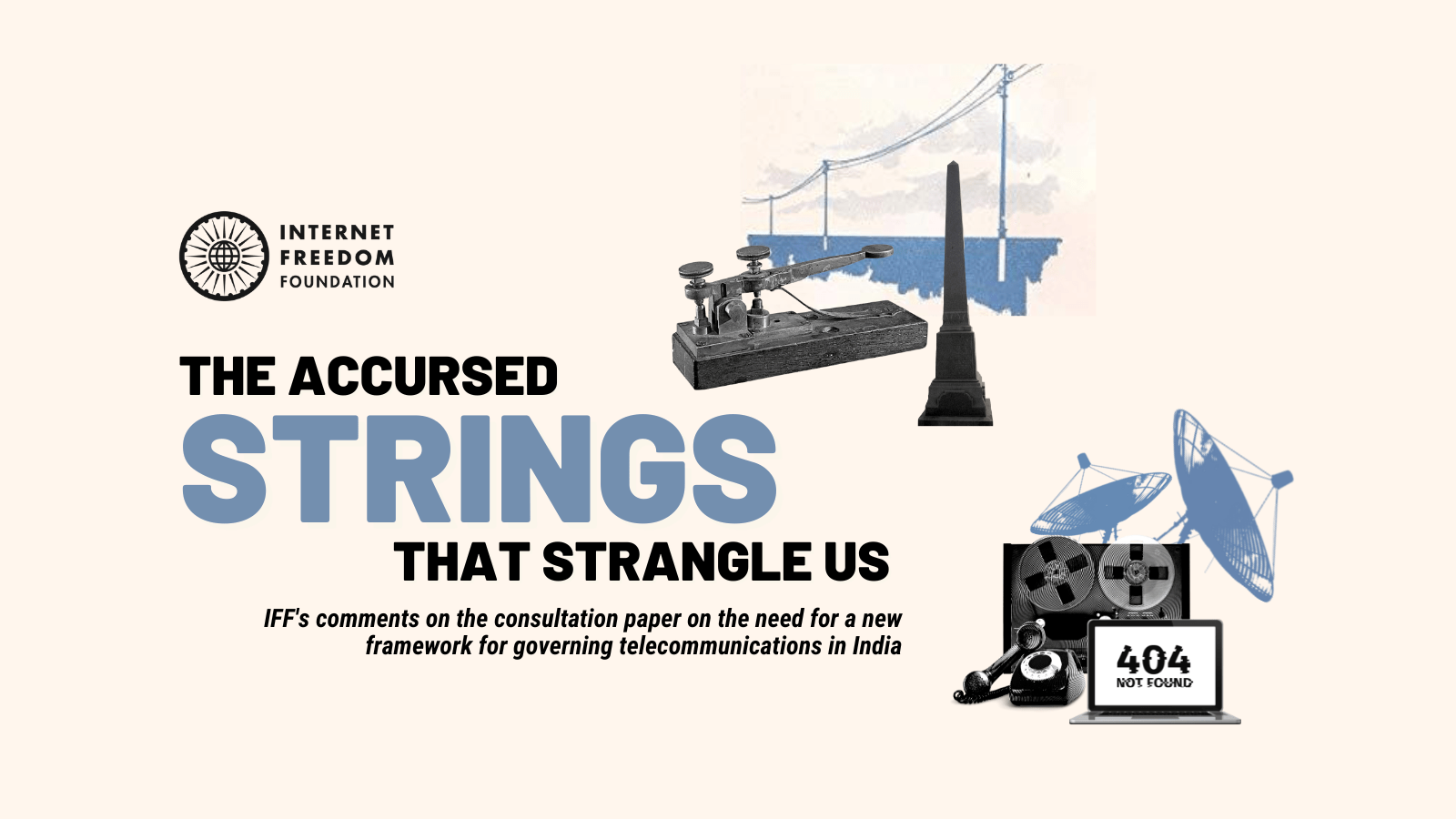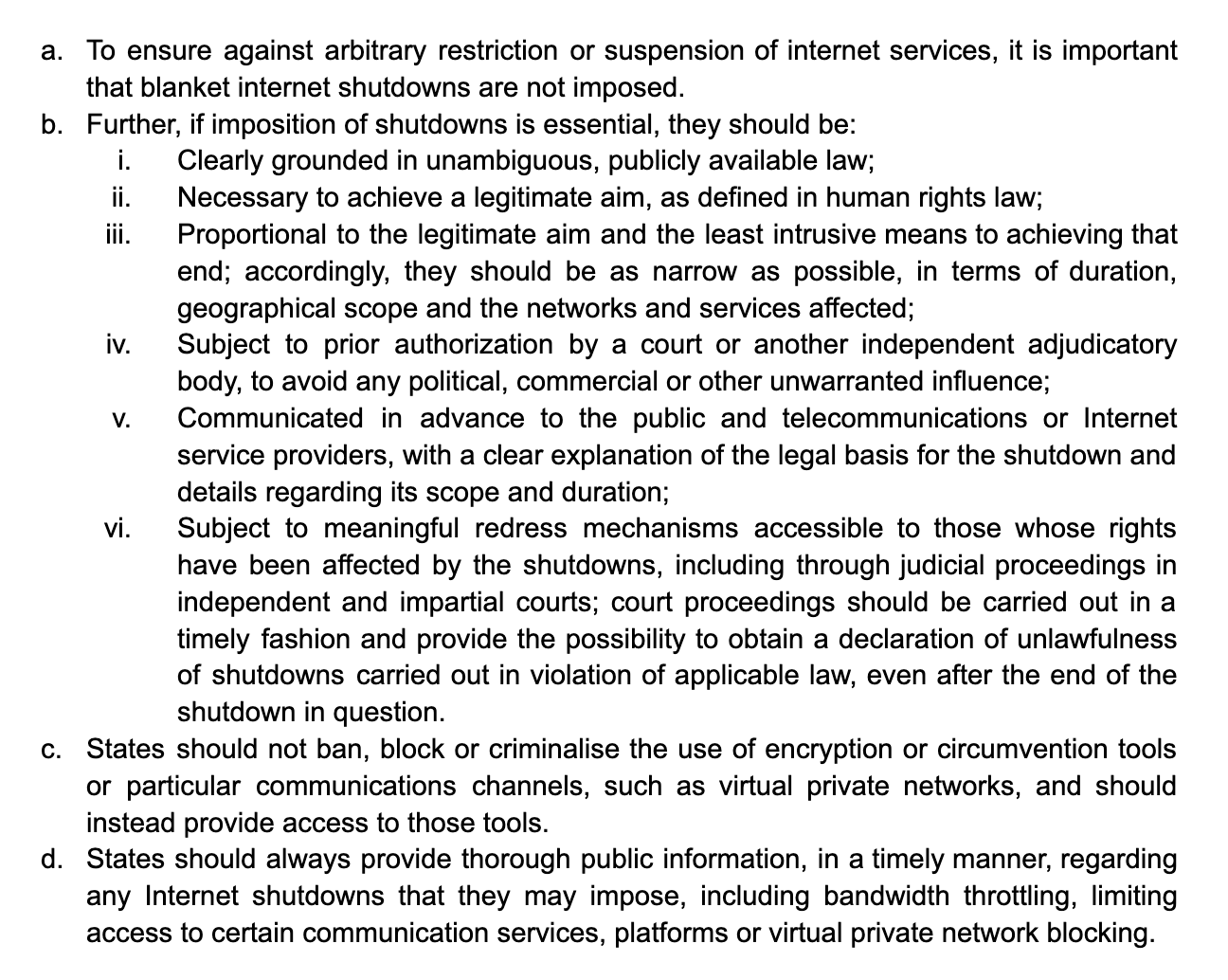
tl;dr
On July 23, 2022, the Department of Telecommunications (DoT) released a consultation paper on the need for a new framework for governing telecommunications in India. Read our response engaging with specific issues such as internet shutdowns, net neutrality, and an overhaul of the surveillance framework contained in the Indian Telegraph Act, 1885.
Why should you care?
“There is the accursed string that strangles us”, cried a mutineer captured in the aftermath of the Indian Rebellion of 1857. On his way to being executed, the mutineer was referring to a telegraph line. The technical superiority gained from the electric telegraph has been attributed with playing a significant role in the British campaign against Indian mutineers, which ultimately allowed them to emerge victorious. Telecommunications is the bedrock of the digital transformation that has reshaped our lives in the past century. It is also an essential facilitator of the digital governance initiatives of the Government of India.
In the matter of the Secretary Minister of Information & Broadcasting v Cricket Association of Bengal, the Supreme Court held that, “airwaves or frequencies are a public property. Their use has to be controlled and regulated by a public authority in the interests of the public and to prevent the invasion of their rights.” However, the laws regulating this sector have not kept up with the modernisation of telecommunication technology. As a result, many issues related to the telecommunications sector which have an effect on access and connectivity, such as internet shutdowns, are being regulated by bringing them under older provisions which were not drafted for them specifically. This results in important issues being regulated by provisions which are beyond their scope, ambit, and intent.
What does the consultation paper say?
The paper has been divided into 10 sections related to issues such as simplifying the regulatory framework, spectrum management, right of way, insolvency, and the Universal Service Obligation Fund (USOF). The paper also indicates a need for a new law and a simplified regulatory framework. A bulleted summary of the paper highlighting its main suggestions may be accessed here. While the paper discusses certain essential issues which have to be addressed in this overhaul, it conspicuously misses certain important points.
Summary of our response
In our response to this paper, we have pointed out certain necessary additions to be made in the new framework as well as the need for the revision of existing standards for public safety and national security.
Necessary additions to be made in the new framework
- Net neutrality: On September 22, 2020, the Telecom Regulatory Authority of India (TRAI) had forwarded a set of extremely meaningful recommendations to the Department of Telecommunications (DoT) regarding the enforcement of net neutrality principles by the Internet Service Providers (ISPs) and telecom networks. These recommendations included, the establishment of a Multi Stakeholder Body (MSB) to play an advisory and a regulatory role over the ISPs, overseeing the Traffic Management Practices (TMP) by the ISPs, among other key strategies towards realising the net neutrality principles. However, the DoT has failed to operationalise these recommendations, citing COVID-19 related budgetary concerns and other feasibility concerns related to the implementation of MSB. Further, with 5G technology being adopted in the near future, there are concerns that it will affect consumer experience and net neutrality. Speaking at a panel discussion, the Director-General of the Cellular Operators Association of India (COAI), SP Kochhar said that tailoring networks for specific use cases - which is a unique quality of 5G technology - will be in direct contradiction to net neutrality laws in India. Therefore, it is important that TRAI again affirm its stand that the net neutrality principles adopted shall remain technology-neutral.
Revision of existing standards for public safety and national security
- Surveillance: The existing framework for surveillance under the Telegraph Act suffers from a failure to specifically define grounds of surveillance, lacks sufficient oversight, and the process for carrying out surveillance fails to provide for constitutional rights of the surveilled.
- Internet shutdowns: The Standing Committee on Communication and Information Technology made a range of recommendations including a review of the legal regime for suspension of internet services, as it found the Department of Telecommunications’ existing process lacks sufficient safeguards, and establishing a database of internet shutdown orders in its report on ‘Suspension of telecom services/internet and its impact’. The Committee also noted that since the Department of Telecommunications was the nodal Department for the Suspension Rules, it is the duty of the Department to see and ensure that Review Committees are constituted in all the States.
Our recommendations
In light of these concerns, we made the following recommendations:
- Net Neutrality: The principle of net neutrality requires internet service providers to treat all content equally without prioritising access to any platform by creating “fast lanes” or blocking/throttling access to others. Keeping the net neutral is essential for innovation as otherwise, newer or small/medium-sized companies will struggle to compete with rich corporations that could negotiate deals enabling faster/better access to content on their sites. To ensure that access to the internet is available to all, there is an urgent need that the DoT adopts enforcement mechanisms for net neutrality principles into law.
- Surveillance: The fundamental issue with these provisions are their centralisation of power with the Executive branch of government and the lack of any judicial or legislative oversight. This promotes a complete lack of accountability and quite often results in allegations of use of surveillance for political purposes. To ensure that overbroad and illegal surveillance does not take place, it is necessary that this new framework contains provisions that narrowly define grounds of surveillance, provide sufficient judicial oversight of interception orders, and inform the surveilled person of the existence of the surveillance after the fact to ensure that their constitutional rights are protected.
- Internet Shutdowns: The Report of the Office of the United Nations High Commissioner for Human Rights on “Internet shutdowns: trends, causes, legal implications and impacts on a range of human rights” makes specific suggestions to States with regard to internet shutdowns. These are:


